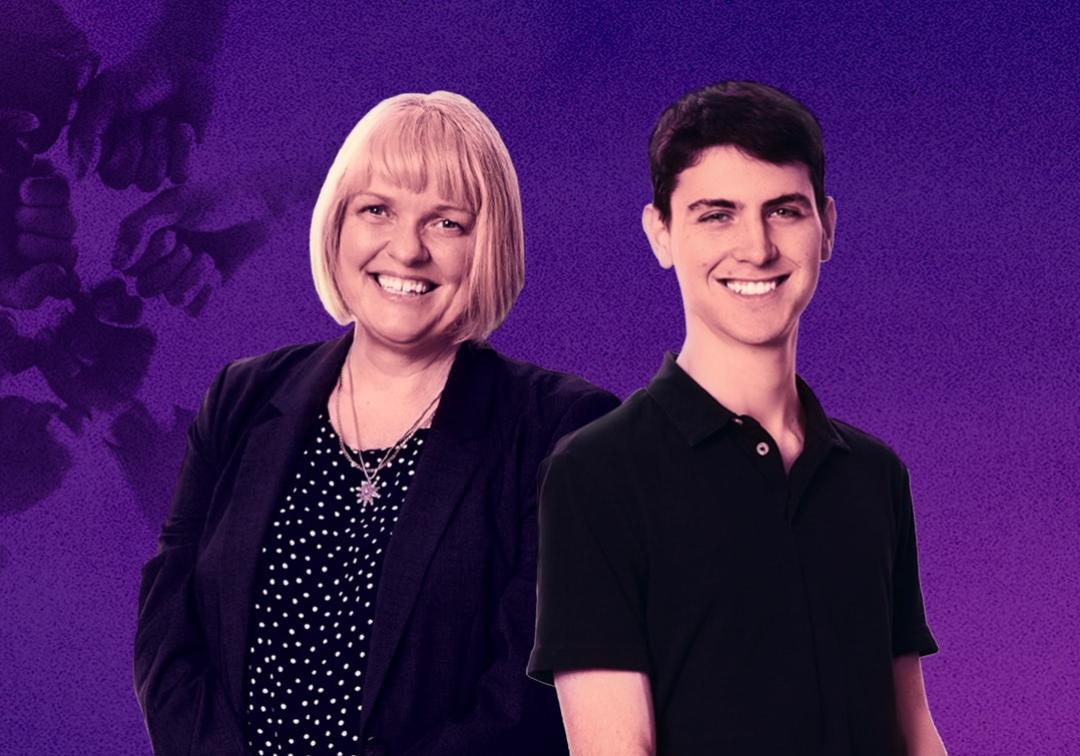
Bachelors of Music / Education (Secondary)
Overview
Music has the power to impact a student's life. Explore the rich and complex world of music education by becoming a music teacher.
Enhance the quality of student development – socially, emotionally and academically through music.
You'll explore how to teach and how people learn, in courses designed specifically for music educators. You'll then apply your knowledge in classrooms. Throughout your program you’ll be immersed in hands-on workshops, school visits and supervised placements, and gain a strong understanding of day-to-day life in a secondary school.
Individual lessons in the Bachelor of Music help you excel in your chosen instrument or voice. To prepare for a teaching career, you'll extend your skills across a range of instruments, and learn techniques for teaching classroom music and directing music ensembles.
You'll graduate as a versatile professional, equipped to teach in schools and other educational contexts.
Program highlights
- Graduate with 2 degrees and be equipped to teach music, create music, and perform music.
- Gain early experience in classrooms, with placements available from your first year.
- Become a specialist choral/instrumental teacher and a classroom music teacher.
How you'll learn
Your learning experiences are designed to best suit the learning outcomes of the courses you choose.
- Lectures
- Tutorials
- Overseas study
- Fieldwork
- Workshops
Placements and work experience
What you'll study
At UQ, degrees are called 'programs' and subjects are called 'courses'.
Career possibilities
Our programs prepare you for your first job and beyond. Here are some of the careers you could be on your way to:
- Secondary school music teacher
- Primary school music teacher
- Music ensemble director
- Private tutor
- Education advocate
- Education project or policy officer
- Musician
- Composer
- Conductor
- Music journalist
Next steps after graduation
Become a classroom music teacher, instrumental music specialist or an ensemble director, to name a few.
You’ll be eligible to apply for registration as a teacher with the Queensland College of Teachers, and to work as a secondary or primary school teacher in state and independent schools in Australia and worldwide. 96 per cent of our secondary education graduates are offered teaching jobs.
Further study and experience can lead to roles as a head of department, principal, guidance officer, learning support teacher, or student adviser.
Other graduates choose to work with non-school-based education providers (such as tutoring companies), government agencies or education advocacy organisations.
With an Honours qualification, you'll stand out with in-depth knowledge and specialist skills, and have the option to pursue further research through a Master of Philosophy or PhD.
Professional memberships
When you graduate, you may be eligible for memberships with the following professional organisations. Contact the organisation to find out how to become a member.
- Queensland College of Teachers
Professional registration
When you graduate, you may be eligible for registration with the following professional organisations. Contact the organisation to find out how to register.
- Queensland College Of Teachers
Program accreditation
The Bachelors of Music / Education (Secondary) is accredited by:
- Australian Institute For Teaching And School Leadership
Events
See all events
7 April - 22 September
Beginner Language Bootcamp at UQ IML
Stories
See all stories
UQ people
Meet the expert: exploring teaching with Dr Simone Smala
3-minute read
Stories
See all stories
UQ people
Meet the expert: exploring teaching with Dr Simone Smala
3-minute read
Entry requirements
Prerequisites
- General English subject (Units 3 & 4, C); and
- General Mathematics, Mathematical Methods or Specialist Mathematics (Units 3 & 4, C); and
- an audition and interview with the School of Music.
Applicants must arrange an audition with the School of Music, to take place between 1 September and 30 November of the year preceding admission. For more information about the audition process (including closing dates and the application form) please visit the School of Music website.
Prerequisites
- General English subject (Units 3 & 4, C); and
- General Mathematics, Mathematical Methods or Specialist Mathematics (Units 3 & 4, C); and
- an audition and interview with the School of Music.
Applicants must arrange an audition with the School of Music, to take place between 1 September and 30 November of the year preceding admission. For more information about the audition process (including closing dates and the application form) please visit the School of Music website.
Minimum entry score
Select where you studied and your qualification to see the minimum entry score you need to be considered for this program.
Use the minimum entry score as a guide. Your score must be at least equivalent to the required Australian Year 12 ATAR score. Entry scores are reviewed each year.
English language requirements
IELTS score of 7.5 overall; speaking 8; listening 8, reading 7, writing 7. For other English Language Proficiency Tests and Scores approved for UQ.
TOEFL iBT (Paper Edition), PTE Academic, BE, CES, and OET are not accepted.
There are other ways to meet the English language requirements. For some programs, additional conditions apply.
Student visas
International students who are accepted into full-time study in the Bachelors of Music / Education (Secondary) are eligible to apply for an Australian student visa (subclass 500).
There are a number of requirements you must satisfy before a visa is granted, including the Genuine Student (GS) requirement.
Need help meeting the entry requirements?
Additional application information
Additional application information
Fees and Scholarships
Indicative annual fee
Approximate yearly cost of tuition (16 units). Your fees will vary according to your selected courses and study load. Fees are reviewed each year and may increase.
$8,249
2025
$8,249
2025
Approximate yearly cost of tuition (16 units). Your fees will vary according to your study load. Fees are reviewed each year and may increase.
AUD $43,200
2025
AUD $43,200
2025
Additional costs
- There may be additional course costs associated with travel or materials.
- Students are expected to fund travel and living expenses associated with placements, some of which may be outside the Brisbane metropolitan area.
- All students are required to successfully meet the Literacy and Numeracy Test for Initial Teacher Education (LANTITE) standards prior to graduation.
- Students are responsible for the cost of the LANTITE (approximately $196 or $98 per test). ACER website (https://teacheredtest.acer.edu.au) lists current fees.
- Please contact the School of Education for further details (education@uq.edu.au) or visit the School of Education office.
- For more information on the LANTITE tests, including sample tests and registration information, please visit the Australian Council for Educational Research website: https://teacheredtest.acer.edu.au
- Students are responsible for the cost of transportation and accommodation to attend residential schools or practicals.
- A clinical uniform shirt is required and may be purchased through the School.
Government assistance
Financial aid
As an international student, you might be eligible for financial aid – either from your home country, or from the Australian Government.
HECS-HELP
Domestic places in the Bachelors of Music / Education (Secondary) are Commonwealth Supported. This means the cost of your education is shared between you and the Australian Government.
Instead of tuition fees, Commonwealth Supported students pay what are called student contribution amounts.
HECS-HELP is an Australian Government loan scheme to assist eligible students with the cost of their student contribution amounts.
Centrelink support
The Australian Government offers a number of income-support payments to eligible Australian university students.
Scholarships
You may be eligible for more than 100 scholarships, including:
...Loading
How to apply
Applying online
If your senior schooling is from outside Australia, you can submit your application to UQ. Or, if you prefer, you can use an approved UQ agent in your country.
The program code for the Bachelors of Music / Education (Secondary) is 2539.
Find out more about applying for undergraduate study
If your senior schooling is from Australia
Submit your application to the Queensland Tertiary Admissions Centre if you're an international student who is currently studying:
- Australian Year 12 (in Australia or another country), or
- the International Baccalaureate in Australia.
The QTAC code for the Bachelors of Music / Education (Secondary) is 723202.
Applying through QTAC
All domestic applications should be submitted to the Queensland Tertiary Admissions Centre (QTAC).
The QTAC code for the Bachelors of Music / Education (Secondary) is 723202.
Important dates
If you’re studying Year 12 in Australia, go to the QTAC website to check the closing date for this program.
If you’re applying to UQ, the closing date for this program is:
- Audition application closing dates are listed on the "Application for Audition" form at www.music.uq.edu.au.
- To commence study in semester 1 - November 30 of the previous year.
To learn more about UQ dates, including semester start dates, view the Academic Calendar.
Important dates
To check the closing date for this program, go to the QTAC website.
To learn more about UQ dates, including semester start dates, view the Academic Calendar.
Admissions schemes
Applying to university can be both exciting and daunting, which is why we’ve tried to make the process as simple as we can.
We have several schemes in place to improve your chances of getting a place at UQ.
Pathway options
A rank or score doesn’t determine your potential.
If you're not offered a place in your first-choice program – or if you don't meet the entry requirements – you still have a number of options.
Aboriginal and Torres Strait Islander applicants
For support with applying – or if you have any questions about university life – get in touch with our Aboriginal and Torres Strait Islander Studies Unit.
Explore other programs
Express yourself. And your interest.
They say choosing a degree is hard, which is why we've made it easy. Register your interest and we'll send you everything you need to know about applying to UQ.




